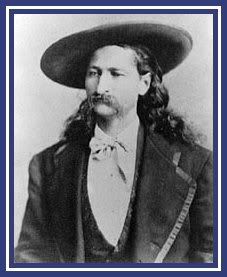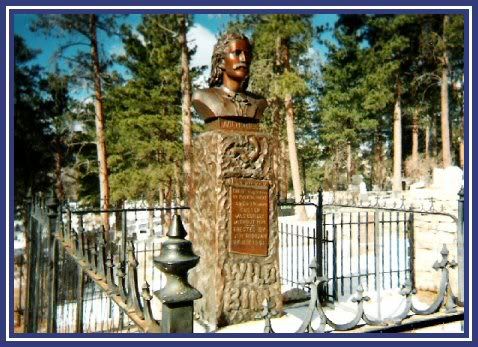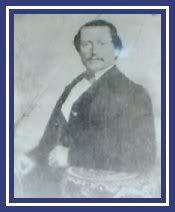The Death of Wild Bill

Wild Bill Hickok
Wild Bill Hickok's death left a gift to the American language, the term "A dead man's hand". As all good poker players knows a "dead man's hand" are Aces and eights, the two found in Wild Bill Hickok's hand when he was shot in the back of the head in Carl Mann's Saloon on August 2, 1876, in Deadwood, Dakota Territory.
THE SHOOTING
On August 1, the day before the shooting, Hickok sat in on several games until the early evening. Each time he reserved the right to have his back against the wall and no one refused him. In fact, it is part of Hickok legend that he always insisted on this precaution, and at this date nothing has been produced to disprove or completely authenticate the story. However, it is in keeping with the actions Wild Bill adopted in public to defend himself against possible attack.
Later in the evening Captain William R. Massie, a former Missouri River pilot who had seen service on the Mississippi, walked in and joined the game. One of the players dropped out, and one of the bystanders took his place. It was Jack McCall. At the end of the evening McCall was broke, and Hickok took pity on him and gave him money enough for his supper. Then, bidding the company goodnight, Wild Bill made his way back to camp, and was soon inside his blanket.
On August 2, Hickok, dressed in his favorite outfit, a Prince Albert frock coat with all the trimming, meandered into's Mann's No. 10 saloon shortly after noon. A nod to Harry Young, the bartender, he walked over to where Carl Mann, Charles Rich and Captain Massie were already engaged in a game. There were about eight people in the room.
At his approach, Mann hailed him and told him to sit down. Hickok hesitated and asked Rich, who had the wall seat, to change round. But he only laughed and told him not to worry, no one was going to attack him. Grudgingly Wild Bill sat down but a few minutes later again asked Rich to change seats. This time all the players good-naturedly ribbed him, and growling uneasily, Wild Bill sat down again. From where he sat, with Rich on his right and Mann on his left, and Massie right in front of him, Hickok had a clear view of the front door, but was conscious of the small door in his rear.
Having beaten Massie the previous evening, Wild Bill was now losing heavily to him. He looked over at Harry Young and asked for Fifteen dollars worth of pocket checks. Young left the bar and came over to them, placed them beside him, then returned to bar.
Shortly before this, the front door swung open and a small, furtive man came in. Some say he was drunk, but others recalled that he gave no such impression as he came up to the bar. Jack McCall stared around. Facing toward him was Wild Bill, but he was busily examining his cards. Quickly he moved down the bar in case Wild Bill looked up, not that Hickok was likely to find much significance in his presence. Reaching the end of the bar, McCall stopped. He was only a few paces behind Hickok's stool.
Wild Bill's attention was on Massie. There was a friendly dispute between them, and Hickok was heard to remark: "The old duffer, he broke me on the hand". Those were the last words he spoke. There was a loud bang and a shout from McCall: "Take That!" A smoking pistol was clutching in his right hand.
As McCall fired, Wild Bill's head jerked forward, and for some moments his body remained motionless. Then it toppled back from the stool to the floor. From his nerveless fingers spilled his cards: the Ace of Spades, the Ace of Clubs, two black eights, Clubs and Spades, and the Jack of Diamonds. Ever afterward they would be known as "Aces and Eights" - "The Dead Man's Hand."
Backing towards the rear door, McCall abused the crowd with words before running out. He mounted the first horse he saw. Unfortunately for him, the owner had slacked the saddle cinch because of the heat, and immediately the saddle turned over, sending McCall sprawling to the ground. Gasping for breath, he staggered to this feet and ran down the street, pursed by the excited cry: "Wild Bill is shot! Wild Bill is dead!" It was a little before 3:00 p.m. James Butler Hickok was thirty-nine.
Back at the saloon some order was being restored. The doors were locked, and only friends of the deceased and people in authority were allowed in. A brief examination conducted by a hastily organized coroner's court, with C.H. Sheldon as foreman, established that the bullet had entered "the base of the brain, a little to the right of center, passing through in a straight line, making its exit through the right cheek between the upper and lower jaw bones, loosening several of the molar teeth in its passage, and carrying a portion of the cerebellum through the wound. From the nature of the wound death must necessarily have been instantaneous." Having killed Hickok, the ball then lodged in Captain Massie's left wrist.
THE FUNERAL
Wild Bill's funeral was set for the afternoon of August 3. The pallbearers were Bill Hillman, John Oyster, Charles Rich, Jerry Lewis, Charles Young and Tom Dosier.
All morning men filed past the coffin for one last glimpse of the man they called, "The Prince of Pistoleers". Wild Bill was clad in complete dress-suit of black cloth, new underclothing and white linen shirt. Beside him in the coffin laid his trusty carbine rifle, which he prized above all other things. His funeral notice read as follows:
Funeral Notice:
Died, in Deadwood, Black Hills, August 2, 1876, from the effect of a pistol shot, J.B. Hickok, (Wild Bill) formerly of Cheyenne, Wyoming. Funeral Services will be held at Charles Utter's Camp, on Thursday afternoon, August 3, 1876, at 3 o'clock p.m. All are respectfully invited to attend.

Wild Bill Hickok's Grave
Wild Bill was first buried at Ingleside, a prominent spot on a mountain side, but three years to the day of his first burial the citizens moved him to a new permanent cemetery, Mount Moriah, where he is resting today.

Jack McCall
After the shooting Jack McCall ran only a few blocks and ducked into a butcher shop. He was dragged out by Ike Brown and according to some, Hickok's lady friend, Calamity Jane herself.
The next day the aroused citizens organized a court. This citizen's court trial was without legal authority as Deadwood yet had no legal charter. However, a trial judge, jury, prosecuting attorney and defense attorney was held and the defendant was acquitted. His plea would have only been recognized in a Deadwood court. McCall claimed that "Wild Bill" had shot his brother in Kansas years before, and he was just getting even. This statement his been found not to be true. His real motive was fame.
He left Deadwood shortly after the trial and rode south to Laramie, Wyoming. Stupid as he was to have killed Hickok, he was even more stupid to brag about it. He was arrested by Federal officers who did not acknowledge either his defense or his trial and was extradited to Yankton, South Dakota where he was given a legal trial. His second jury found him guilty, and he was sentence to hang on March 1, 1877.
On that day McCall walked up the steps to the platform and placed himself over the trap, still displaying a calmness and nerve that had marked him since his trial. His arms and limbs were bound and he knelt down to pray. He looked toward heaven as he prayed, then rose to his feet. Kissing a crucifix, he remained impassive as the black cap was placed on his head. As Marshal Burdick adjusted the noose, McCall asked for a moment in which to pray. Finally he said: "Draw it tighter, marshal."
At 10:15 the trap was sprung and Jack McCall was dead. Only at the last moment did he display any emotion, when the single, choking cry, "Oh God!" was heard as the drop fell.
Ten minutes later the body was cut down and placed in a neat walnut coffin. He was later buried in the southwest comer of the Catholic cemetery. There he remained until 1881 when the cemetery was removed. An examination revealed that he had been buried with the noose still around his neck.
|












